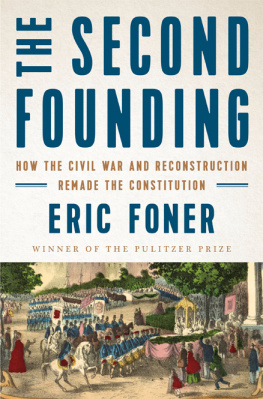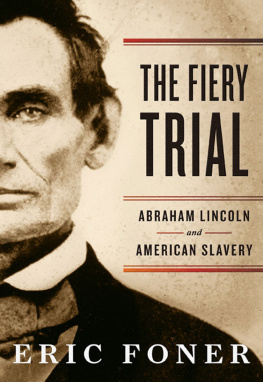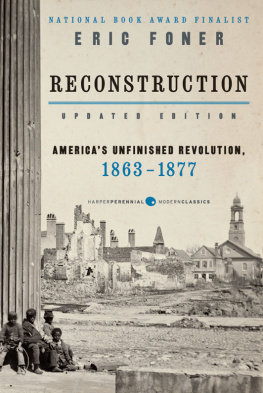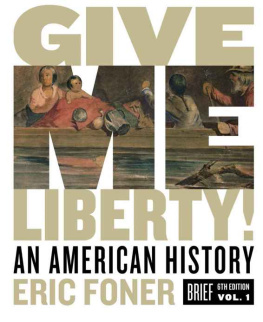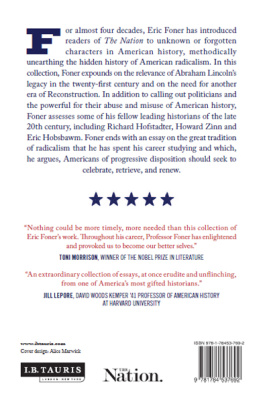
Eric Foner is a Pulitzer Prize-winning historian and DeWitt Clinton Professor of History at Columbia University. He is one of Americas leading historians of the American Civil War and Reconstruction Era. His books include Free Soil, Free Labor, Free Men: The Ideology of the Republican Party Before the Civil War (1969); Reconstruction: Americas Unfinished Revolution, 18631877 (1988); and The Fiery Trial: Abraham Lincoln and American Slavery (2010).
Nothing could be more timely, more needed than this collection of Eric Foners work. For the depth and breadth of his intellect as well as the clarity and precision of his language, he has peers but no superiors. Throughout his career, Professor Foner has enlightened and provoked us to become our better selves.
Toni Morrison,
Winner of the Nobel Prize in Literature
An extraordinary collection of essays, at once erudite and unflinching, from one of Americas most gifted historians.
Jill Lepore,
David Woods Kemper 41 Professor of
American History at Harvard University
Over a span of almost four decades, Eric Foner has consistently illuminated the conflicts of the present with an acute understanding of and sensibility for the past. Henry Ford thought history was more or less bunk. Read Battles for Freedom and learn why it is indispensable to being a good citizen.
Michael Kazin,
editor of Dissent and author of War Against War:
The American Fight for Peace, 19141918

Published in 2017 by
I.B.Tauris & Co. Ltd and The Nation Company, LLC
London New York
www.ibtauris.com
Copyright 2017 The Nation Company, LLC
The right of Eric Foner to be identified as the author
of this work has been asserted by the author in accordance
with the Copyright, Designs and Patents Act 1988.
All rights reserved. Except for brief quotations in a review, this book, or any part thereof, may not be reproduced, stored in or introduced into a retrieval system, or transmitted, in any form or by any means, electronic, mechanical, photocopying, recording or otherwise, without the prior written permission of the publisher.
Every attempt has been made to gain permission for the use of the images in this book. Any omissions will be rectified in future editions.
References to websites were correct at the time of writing.
ISBN: 978 1 78453 769 2
eISBN: 978 1 78672 144 0
ePDF: 978 1 78673 144 9
A full CIP record for this book is available from the British Library
A full CIP record is available from the Library of Congress
Library of Congress Catalog Card Number: available
Contents
by Randall Kennedy
August 20, 1977
June 16, 1979
December 24, 1990
July 29, 1991
May 4, 1992
February 1, 1993
June 26, 1995
October 30, 1995
November 8, 1999
February 14, 2000
August 7, 2000
January 1, 2001
February 5, 2001
October 8, 2001
September 23, 2002
June 2, 2003
March 12, 2007
January 26, 2009
February 1, 2010
February 22, 2010
April 5, 2010
October 22, 2012
October 10, 2011
July 20, 2015
September 14, 2015
November 16, 2015
January 2, 2017
Introduction
by Randall Kennedy
Michael R. Klein Professor, Harvard Law School
F or nearly four decades, The Nation has been the main forum in which Eric Foner has brought his encyclopedic knowledge of American history to bear on discussions of current affairs. He has done so with remarkable verve, care and insight. He is a model intellectual.
The writings collected here cover a wide range of subjects, two of which, often overlapping, are particularly salient: the politics of history and the politics of race. In dispatches from the culture wars, Foner offers shrewd reports on various controversies and their recurring casts of characters: authorities who try to impose a relentlessly celebratory depiction of the American past, revisionists who insist upon more realistic portrayals, and the scourges of political correctness, a motley coalition he describes as longtime conservatives, onetime radicals and academics enamored of campus life before the advent of large numbers of women and minority students.
Characteristic of Foners contributions to these debates is Fighting for the West, a piece written with historian Jon Wiener, in which the authors describe a fight that erupted over an exhibit at the Smithsonian Institutions National Museum of American Art, The West as America: Reinterpreting Images of the Frontier, 1820-1920. The exhibit featured iconic imagery by esteemed artists such as Frederic Remington, but it also questioned that iconography in commentaries that elicited considerable ire. Charles Krauthammer complained that the commentaries displayed a crude half-baked Marxist meanness that expressed contempt for every achievement of Western expansion. A reviewer for the Washington Post called the show the most cynical exhibit ever presented under the aegis of your tax dollars and mine, asserting that it trashe[d] most of our national history. The famously cantankerous Republican senator from Alaska, Ted Stevens, held a congressional hearing in which he accused the museum of advancing a leftist agenda and threatened to pare its budget.
Foner and Wiener champion the exhibit, praising the curators for suggesting that viewers bring a questioning attitude toward the artwork displayedthat they ask, among other things, whether the artist was engaged simply in straightforward documentation or in rendering an idealized or derogatory depiction that says as much about the artist and his assumptions as about his purported subject. The piece lauds the curators for informing audiences about prejudices that should be considered in interpreting artistic portrayals of the winning of the West, noting, for example, that in evaluating Remingtons port rayals of cowboys and Indians it is useful to keep in mind his detestation of Native Americans and others he deemed to be despicable inferiors. JewsingunschinamenItaliansHuns, Remington wrote, were the rubish of the earth I hate.
Foner and Wiener commend the museum for including not only familiar tales about white pioneers, but also unfamiliar information about the mistreatment of Indian nations and environmental degradation. Long devoted simply to collecting and displaying memorabilia of prominent men and emblems of American greatness, the Smithsonian and other museums, they observe, are now seeking to present a more complex, diversified and critical portrait of the American past. Properly conveyed, the story of westward expansion is a story of success and failure, heroism and betrayal, capitalist triumph and labor exploitation. Colorado miners and Mexican peons are as much a part of the story as pioneers on the Oregon Trail. In other words, the Wests development was a complex history, not a simple heroic progress.
Confronting the political correctness canard, Foner concedes that some revisionists have probably gone overboard in their denunciations. He rightly notes, however, that such abuses are a relatively minor problem that is eclipsed by much larger threats to American cultural life, including dwindling public funds, rising corporate influence, the fragmentation of scholarship and widespread illiteracy. Addressing the charge that left revisionists pose a danger due to alleged efforts at political indoctrination, Foner aptly observes that it is the right, not the left, that today poses the real threat to intellectual freedom. Left revisionists are not the ones who threaten museums with defunding, prompting their frightened staffs to tone down presentations that might offend thin-skinned observers. That is the handiwork of right-wing politicians and publicists who indulge in cultural coercions of all sorts, free of worry that they will incur the wrath of the Wall Street Journal and other forums of reaction that are somehow blind to repression unless it can be tarred as left or liberal or multicultural.
Next page

